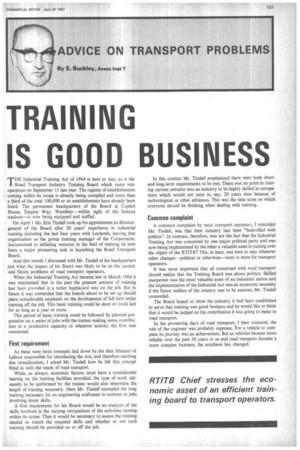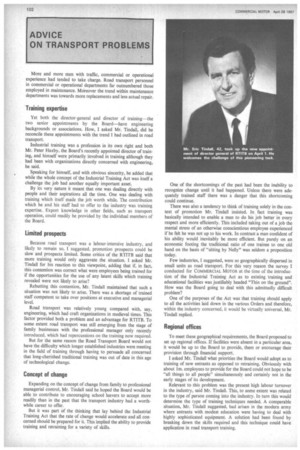TRAINING IS GOOD BUSINESS
Page 103

Page 104

If you've noticed an error in this article please click here to report it so we can fix it.
THE Industrial Training Act of 1964 is here to stay, as is the Road Transport Industry Training Board which came into operation on September 15 last year. The register of establishments coming within its scope is already being compiled and more than a third of the total 100,000 or so establishments have already been listed. The permanent headquarters of the Board at Capitol House, Empire Way, Wembley—within sight of the famous stadium—is now being equipped and staffed.
On April 1 Mr. Eric Tindall took up his appointment as directorgeneral of the Board after 20 years' experience in industrial training including the last four years with Leylands, leaving that organization as the group training manager of the Corporation. Accustomed to initiating ventures in the field of training he now faces a major pioneering task in launching the Road Transport Board.
And this month I discussed with Mr. Tindall at his headquarters just what the impact of his Board was likely to be on the current and future problems of road transport operators.
When the Industrial Training Act became law in March 1964 it was maintained that in the past the greatest amount of training had been provided in a rather haphazard way on the job. But in future it was contended that the boards about to be set up should place considerable emphasis on the development of full-time initial training off the job. This basic training could be short or could last for as long as a year or more.
This period of basic training could be followed by planned progression on a series of jobs with the trainee making sonic contribution in a productive capacity to whatever activity the firm was concerned.
First requirement
As these were basic concepts laid down by the then Minister of Labour responsible for introducing the Act, and therefore meriting due consideration, I asked Mr. Tindall how he felt this concept fitted in with the needs of road transport.
While, as always, economic factors must have a considerable bearing on the training facilities provided, the type of work ultimately to be performed by the trainee would also determine the length of training necessary. Here Mr. Tindall exampled the long training necessary for an engineering craftsman in contrast to jobs involving lesser skills.
A first requirement for his Board would be an analysis of the skills involved in the varying occupations of the activities coming within its scope. Then it would be necessary to assess the training needed to match the required skills and whether or not such training should be provided on or off the job. In this context Mr. Tindall emphasized there were both shortand long-term requirements to be met. There was no point in training current entrants into an industry to be highly skilled in occupations which would not exist in, say, 20 years time because of technological or other advances. This was the time scale on which everyone should be thinking when dealing with training.
Common complaint
A common complaint by most transport operators, I reminded Mr. Tindall, was that their industry had been "bedevilled with politics". In contrast, therefore, was not the fact that the Industrial Training Act was conceived by one major political party and was now being implemented by the other a valuable asset in putting over the object of the RTITB? This, at least, was here to stay whatever other changes—political or otherwise—were in store for transport operators.
It was most important that all concerned with road transport should realize that the Training Board was above politics. Skilled manpower was the most valuable asset of an industrial nation and the implementation of the Industrial Act was an economic necessity if the future welfare of the country was to be assured, Mr. Tindall contended.
The Board hoped to show the industry it had been established to serve that training was good business and he would like to think that it would be judged on the contribution it was going to make to road transport.
In the pioneering days of road transport, I then ventured, the role of the engineer was probably supreme. For a vehicle to complete its journey was an achievement. But as vehicles became more reliable over the past 50 years or so and road transport became a more complex business, the emphasis has changed. More and more men with traffic, commercial or operational experience had tended to take charge. Road transport personnel in commercial or operational departments far outnumbered those employed in maintenance. Moreover the trend within maintenance departments was towards more replacements and less actual repair.
Training expertise
Yet both the director-general and director of training—the two senior appointments by the Board—have engineering backgrounds or associations. How, I asked Mr. Tindall, did he reconcile these appointments with the trend I had outlined in road transport.
Industrial training was a profession in its own right and both Mr. Peter Haxby. the Board's recently appointed director of training, and himself were primarily involved in training although they had been with organizations directly concerned with engineering, he said.
Speaking for himself, and with obvious sincerity, he added that while the whole concept of the Industrial Training Act was itself a challenge the job had another equally important asset.
By its very nature it meant that one was dealing directly with people and their aspirations all the time. One was dealing with training which itself made the job worth while. The contribution which he and his staff had to offer to the industry was training expertise. Export knowledge in other fields, such as transport operation, could readily be provided by the individual members of the Board.
Limited prospects
Because road transport was a labour-intensive industry, and likely to remain so, I suggested, promotion prospects could be slow and prospects limited. Some critics of the RTITB said that more training would only aggravate the situation. I asked Mr. Tindall for his reaction to this viewpoint, adding that if, in fact, this contention was correct what were employees being trained for if the opportunities for the use of any latent skills which training revealed were not likely to arise?
Rebutting this contention, Mr. Tindall maintained that such a situation was not likely to arise. There was a shortage of trained staff competent to take over positions at executive and managerial level.
Road transport was relatively young compared with, say, engineering, which had craft organizations in medieval times. This factor provided both a problem and an advantage for RTITB. To some extent road transport was still emerging from the stage of family businesses with the professional manager only recently introduced, which had repercussions on the training now required.
But for the same reason the Road Transport Board would not have the difficulty which longer established industries were meeting in the field of training through having to persuade all concerned that long-cherished traditional training was out of date in this age of technological change.
Concept of change
Expanding on the concept of change from family to professional managerial control, Mr. Tindall said he hoped the Board would be able to contribute to encouraging school leavers to accept more readily than in the past that the transport industry had a worthwhile career to offer.
But it was part of the thinking that lay behind the Industrial Training Act that the rate of change would accelerate and all concerned should be prepared for it. This implied the ability to provide training and retraining for a variety of skills. One of the shortcomings of the past had been the inability to recognize change until it had happened. Unless there were adequately trained staff there was a danger that this shortcoming could continue.
There was also a tendency to think of training solely in the context of promotion Mr. Tindall insisted. In fact training was basically intended to enable a man to do his job better in every respect and more efficiently. This included taking out of a job the mental stress of an otherwise conscientious employee experienced if he felt he was not up to his work. In contrast a man confident of his ability would inevitably be more efficient. But purely on an economic footing the traditional ratio of one trainee to one old hand on the basis of "sitting by Nelly" was seldom a proposition today.
Few industries, I suggested, were so geographically dispersed in small units as road transport. For this very reason the survey I conducted for COMMERCIAL MOTOR at the time of the introduction of the Industrial Training Act as to existing training and educational facilities was justifiably headed "Thin on the ground". How was the Board going to deal with this admittedly difficult problem?
One of the purposes of the Act was that training should apply to all the activities laid down in the various Orders and therefore, within the industry concerned, it would be virtually universal, Mr. Tindall replied.
Regional offices
To meet these geographical requirements, the Board proposed to set up regional offices. If facilities were absent in a particular area, it would be up to the Board to provide, them or encourage their provision through financial support.
I asked Mr. Tindall what priorities the Board would adopt as to training of new entrants as opposed to retraining. Obviously with about I m. employees to provide for the Board could not hope to be "all things to all people" simultaneously and certainly not in the early stages of its development.
Relevant to this problem was the present high labour turnover in the industry, said Mr. Tindall. This, to some extent was related to the type of person coming into the industry. In turn this would determine the type of training techniques needed. A comparable situation, Mr. Tindall suggested, had arisen in the modern army where entrants with modest education were having to deal with highly sophisticated equipment. A solution had been found by breaking down the skills required and this technique could have application in road transport training.
















































































































































































